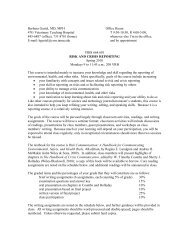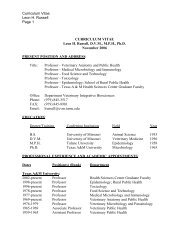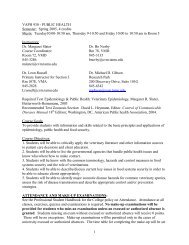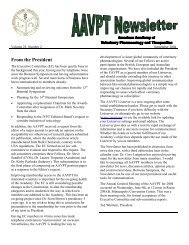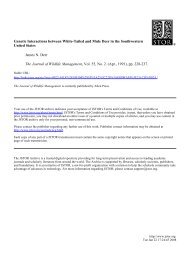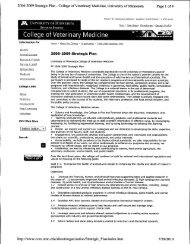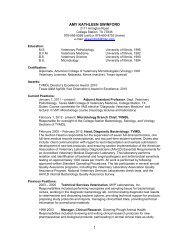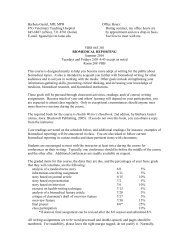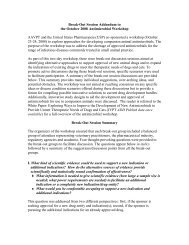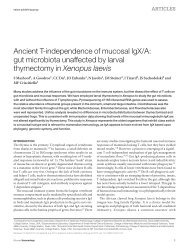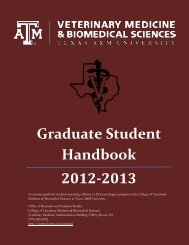Disaster - College of Veterinary Medicine - Texas A&M University
Disaster - College of Veterinary Medicine - Texas A&M University
Disaster - College of Veterinary Medicine - Texas A&M University
Create successful ePaper yourself
Turn your PDF publications into a flip-book with our unique Google optimized e-Paper software.
we need to make sure that in the eyes <strong>of</strong> society, we are not<br />
violating societal ethics.<br />
Society loves horses; people see them as noble and<br />
majestic animals. I suspect most <strong>of</strong> us started out our love<br />
affairs with horses feeling exactly the same way. However,<br />
as we become more deeply entrenched in the showing/winning<br />
aspect <strong>of</strong> our industry, we <strong>of</strong>ten lose contact with why<br />
we entered the industry in the beginning and we shift our<br />
emphasis to winning rather than on the well-being <strong>of</strong> the<br />
horse. The descriptive term for this is “habituation” which is<br />
“a reduction <strong>of</strong> a behavioral response to a specific stimulus<br />
that occurs repeatedly.” In other words, in the case <strong>of</strong> extreme<br />
training techniques, we learn to ignore those stimuli<br />
that at first we find <strong>of</strong>fensive. We ignore them because we<br />
want to win and believe these techniques are necessary to<br />
win. We ignore them because we see successful people do<br />
them. Worse, we ignore what we see happening because we<br />
are afraid <strong>of</strong> being embarrassed and ostracized for speaking<br />
out. Sometimes we forget who brought us and forsake our<br />
original intent for “winning at all costs.”<br />
Further, we learn to ignore our responsibility to the<br />
societal ethics in which we were reared. This is where the<br />
tension between societal ethics and personal ethics reaches<br />
an impasse and eventually conflict results. If a piece <strong>of</strong><br />
society chooses to ignore societal ethics long enough, these<br />
violations will come to the attention <strong>of</strong> the people in the segments<br />
<strong>of</strong> society that are looking for a cause for which they<br />
can be the spokespeople. That’s where we are with animal<br />
welfare, especially equine welfare. Society has seen too many<br />
horses abused, over-worked, and broken down.<br />
I know most <strong>of</strong> you love horses, and you want to give<br />
something back to the industry. Go a step farther and take<br />
on the responsibility <strong>of</strong> protecting the horse—our horse, the<br />
American Quarter Horse—the animal that we loved and respected<br />
enough to get into this industry. So what can we do<br />
as judges? We can walk by the warm-up arena, we can watch<br />
the schooling that takes place in the ring and we can refuse<br />
to reward intimidation regardless <strong>of</strong> who is showing. We can<br />
look for abuse, either mental or physical. As leaders <strong>of</strong> our<br />
breed and the chosen few who are respected by our fellow<br />
members, we can choose not to accept or defend or, more<br />
importantly, practice actions that are inhumane.<br />
At Colorado State <strong>University</strong>, I was privileged to work<br />
with Bernie Rollin, Ph.D., a philosopher who has taken on<br />
the task <strong>of</strong> protecting the welfare <strong>of</strong> all animals, particularly<br />
farm and laboratory animals. He believes that as an industry<br />
we are “low-hanging fruit” for the animal activists <strong>of</strong> the<br />
world. He believes we must immediately cease what we are<br />
doing that is inhumane and that can’t be defended to any<br />
rational audience that loves horses. My favorite quote <strong>of</strong> Dr.<br />
Rollins’ is that we “need to stop doing the 5 percent that society<br />
spends 95 percent <strong>of</strong> its time criticizing.” Think about<br />
that for just a moment: Let’s stop doing the small pieces <strong>of</strong><br />
what we do that society spends the most time criticizing.<br />
Each <strong>of</strong> us can think <strong>of</strong> a few things that are so obviously<br />
wrong at our shows and in training that we would all agree<br />
are not pleasant, comfortable, or enjoyable for the horse.<br />
If we as an industry don’t want outside authorities dictating<br />
how we show and present our American Quarter Horses,<br />
we need to begin cleaning up our industry. I don’t think<br />
any <strong>of</strong> us wants the government to control what and how we<br />
show. There are all sorts <strong>of</strong> ways to address an issue: We can<br />
defend it, ignore it and hope no one notices, or we can fix<br />
it. As judges, we can do the right thing for the benefit and<br />
the future <strong>of</strong> the horse. Be a judge who is known to protect<br />
the horse, our industry and our future. Think about all that<br />
could happen to us as a breed if we don’t do something ourselves<br />
to stop the criticism we are receiving. The American<br />
Quarter Horse has been good to each <strong>of</strong> us; let’s make sure<br />
we are good to it in return.<br />
Carol Rose inducted into<br />
AQHA Hall <strong>of</strong> Fame<br />
The <strong>Texas</strong> A&M <strong>College</strong> <strong>of</strong> <strong>Veterinary</strong> <strong>Medicine</strong> & Biomedical<br />
Sciences (CVM) congratulates Carol Rose on her induction into the<br />
AQHA Hall <strong>of</strong> Fame. In an unprecedented manner, both Carol and<br />
her legendary horse, Zan Parr Bar, were inducted at the same time<br />
in 2010.<br />
Rose is a pioneer. She was the first woman ever to qualify for<br />
the National Cutting Horse Futurity finals. She went on to be the<br />
NCHA non-pro world champion in 1967, 1968, 1969, and again<br />
in 1975. Her performance in the show ring has translated to her<br />
contributions to the horse industry. In addition to being an AQHA<br />
judge she was the first woman to serve on the prestigious AQHA<br />
judges committee. Rose is known for her keen business acumen.<br />
Her Quarter Horse operation ranks among the best, having produced<br />
25 world championships and 30 reserve world championships,<br />
among a multitude <strong>of</strong> other award winners.<br />
Zan Parr Bar is the second <strong>of</strong> Rose’s horses to be inducted into<br />
the AQHA Hall <strong>of</strong> Fame. He was world champion halter stallion<br />
three times, the first ever to achieve that mark. He was also a<br />
multiple award winning performance horse who went on to become<br />
an outstanding sire. At the time <strong>of</strong> his death in 1987, he was<br />
AQHA’s leading sire <strong>of</strong> performance horses. Today, 23 years after<br />
his death, he ranks 6th on the list <strong>of</strong> all-time leading point earners.<br />
His influence on the breed persists today.<br />
Rose is definitely a friend <strong>of</strong> the CVM. She has been a long-time<br />
client <strong>of</strong> the <strong>Veterinary</strong> Medical Teaching Hospital and supporter<br />
<strong>of</strong> the college in a variety <strong>of</strong> ways. She has contributed to the<br />
success <strong>of</strong> the Legends Premier Stallion Season Auction, not only<br />
through her own donations, but also through encouragement <strong>of</strong><br />
other donors. Recently she served as an important member <strong>of</strong> the<br />
Assessment Team for the newly forming Equine Sciences Initiative<br />
at <strong>Texas</strong> A&M. She understands the importance <strong>of</strong> strong educational,<br />
research, and outreach programs, as well as strong connections<br />
with the animal industries.<br />
We congratulate Carol Rose on this recognition and look forward<br />
to her continued involvement in the CVM.<br />
CVM Today • Summer 2010 • 9



